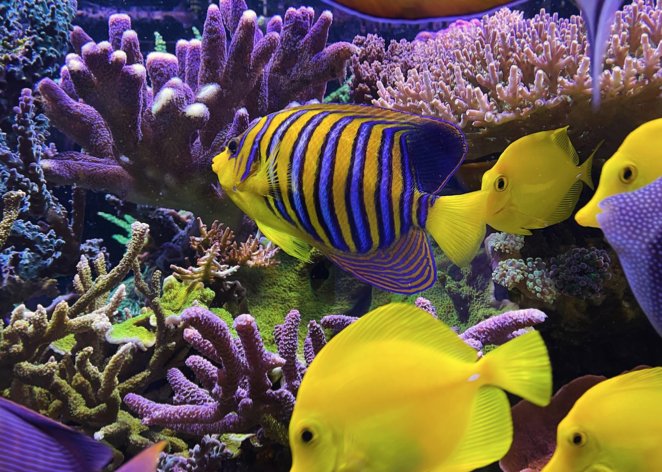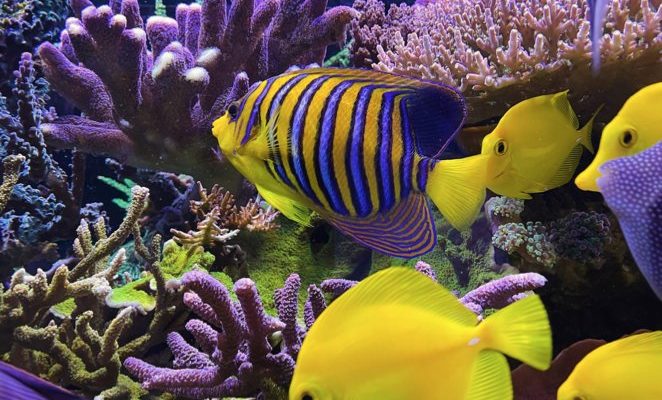
First off, there are several varieties of Marine Angelfish—from the vibrant *Regal Angelfish* to the striking *Flame Angelfish*. Each one brings its own charm and personality to the aquarium. However, their behavior and eating habits can vary quite a bit depending on the species. Understanding how these fish interact with corals can help ensure your reef tank remains a thriving ecosystem. Grab a cup of coffee, and let’s break it down!
What Makes Angelfish Special?
To appreciate whether Marine Angelfish are reef-safe, we first need to understand what makes them tick. These fish are known for their stunning colors and unique patterns. They add a splash of vibrancy to any aquarium, almost like a Picasso painting coming to life. But looks aren’t everything—Marine Angelfish are also social creatures that enjoy swimming in a bit of space.
Angelfish belong to the *Pomacanthidae* family, and they are typically found in warm waters around reefs. They are generally peaceful but do have the potential for aggression, especially if they feel threatened or crowded. It’s important to note that some species of Angelfish have been known to nip at corals, which can cause damage. Just like a toddler with a new toy, sometimes their curiosity can lead to trouble!
Are Marine Angelfish Reef Safe?
So, the big question: Are Marine Angelfish reef-safe? The short answer is that it depends on the specific species and the setup of your tank. Some Angelfish, like the *Flame Angelfish*, can be relatively harmless to corals and often coexist without causing havoc. However, others might see your corals as a snack.
Here’s a closer look:
- Flame Angelfish: Generally considered reef-safe, but they may nip at soft corals and some small-polyped stony corals.
- Regal Angelfish: More likely to munch on coral polyps. Tread carefully if you have delicate corals.
- Cinnamon Angelfish: They can be a bit nibbly towards corals, so it’s best to keep an eye on them.
In short, while some Marine Angelfish can fit nicely into reef setups, others might become problematic. The key lies in knowing your specific species and monitoring their behavior closely.
Choosing the Right Friends for Your Angelfish
Compatibility isn’t just about whether the Angelfish can coexist with corals; it’s also about the other fish in the tank. Marine Angelfish usually prefer to be the stars of the show, which can lead to territorial battles if they’re housed with more aggressive fish.
When selecting tank mates, consider these friendly options:
- Clownfish: These lively fish can share the tank without stepping on any fins.
- Gobies: Peaceful and small, gobies are great companions that won’t bother the Angelfish.
- Wrasses: These fish add color and activity without causing too much drama.
And here’s the thing—always provide plenty of hiding spots and swimming space in your aquarium. This strategy not only keeps your Angelfish entertained but also reduces stress for all tank inhabitants.
Creating a Reef Environment for Marine Angelfish
If you’re determined to keep Marine Angelfish in a reef setting, it’s crucial to create the right environment. Think of your aquarium as a beautifully crafted stage where every element plays a role. Here are some tips for making your reef an Angelfish-friendly haven:
1. Live Rock: Use lots of live rock for hiding spots and grazing opportunities. Angelfish love to nibble on algae and sponges that grow on the rock.
2. Coral Selection: Choose hardy corals like *zoanthids* or *mushroom corals* that are less likely to be bothered.
3. Water Quality: Maintaining excellent water parameters is key. A clean, stable environment helps minimize stress for your fish, making them less likely to pick at corals.
A well-maintained reef environment can greatly increase the chances of peaceful coexistence between your Angelfish and corals.
Monitoring Behavior and Adjustments
Even with careful planning, fish behavior can be unpredictable. You might find your Angelfish bubbly and friendly one day and a little more aggressive the next. This variability can be influenced by factors like tank overcrowding or changes in water quality. Here are some signs to look out for:
– Nipping: If you catch your Angelfish nipping at the edges of corals, it’s a signal that something might be off. Monitor and adjust if needed.
– Hiding: If your Angelfish are hiding frequently, it might indicate stress. Check water parameters and the overall tank dynamics.
– Aggression: If you see increased aggression towards tank mates, consider rearranging decorations to break up territories.
Understanding and adapting to your Angelfish’s behavior can help maintain a peaceful, thriving reef environment.
Other Considerations for Fish Keepers
Before jumping in, here are a few last thoughts for beginner aquarists considering Marine Angelfish for their reef tank:
– Tank Size: Larger tanks generally provide a better environment for Angelfish, offering them space to roam and establish their territory without causing issues.
– Feeding: Keep your Angelfish well-fed with a balanced diet. This may reduce the likelihood of them nibbling on corals due to hunger.
– Quarantine: Always quarantine new fish before introducing them to your main tank. This step helps prevent any potential diseases and allows you to observe their behavior up close.
By taking these considerations into account, you can better ensure a happy, healthy aquarium.
In the end, the compatibility of Marine Angelfish with coral really comes down to the specific species and how well you set up and maintain your aquarium. While some Angelfish can live harmoniously in a reef environment, others may pose a threat to your cherished corals. Understanding their behavior, choosing suitable tank mates, and creating the right environment will be essential steps in your reef-keeping journey.
Remember, every tank is unique, so trust your instincts and observations. Happy fishkeeping!

